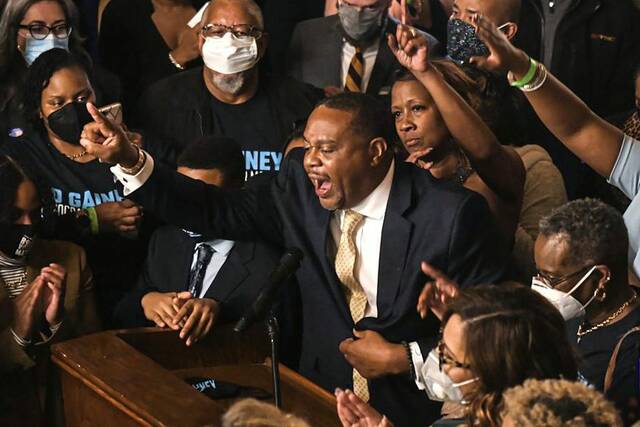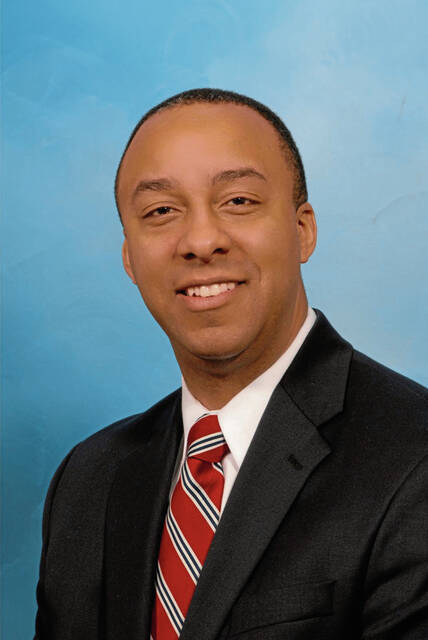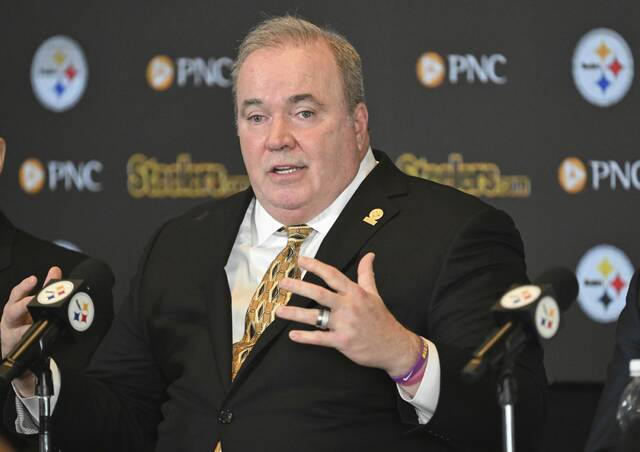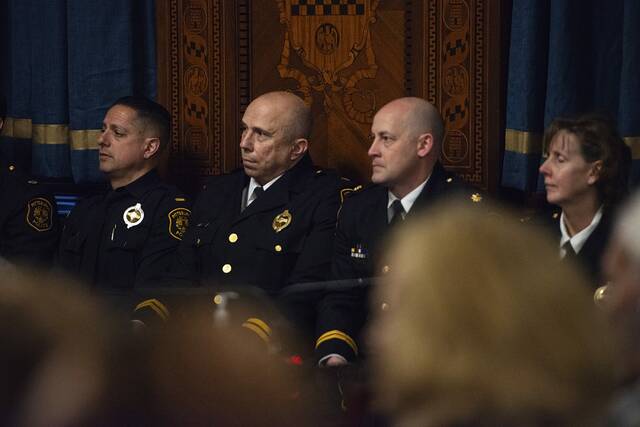Ed Gainey is poised to become Pittsburgh’s first Black mayor, something community activists and residents say they hope will lead to more representation for the city’s minority residents.
Gainey, a Democratic state representative from Lincoln-Lemington, handily defeated Republican challenger Tony Moreno. Gainey garnered about 70% of the vote, according to unofficial results.
He campaigned on promises to celebrate diversity in Pittsburgh and unite a city that has struggled to overcome racial disparities.
“I think it’s really important for the obvious historical significance and the fact that Pittsburgh, if not Western Pennsylvania in general, has sort of had a bad rap in some circles for not being the most equal-opportunity area for people of color, not the most welcome place,” said Val Pennington, a classmate of Gainey’s at Peabody High School in East Liberty.
Pennington himself was elected Tuesday as Bellevue’s first Black mayor.
“It’s always been an unspoken rule that if you’re a person of color and you want to make something of yourself, you need to leave here,” he said.
That’s the kind of mentality that Pennington — and many activists and residents — hopes will change with a Black mayor in office.
‘Our Obama moment’
“We have been hearing as Black residents and organizers about how Pittsburgh wanted to be a city that’s livable for everybody, but report after report has shown that’s not the case,” said Jasiri X, a local Black activist and founder of 1Hood Media.
“We have the opportunity to have somebody in office that has our shared experiences, that understands the obstacles,” he added. “It seems like it’s closer to Pittsburgh being a place livable for everybody. It’s possible through the fact that we have somebody who has experienced the other side of Pittsburgh.”
Jasiri X said it “felt different” when he joined other Gainey supporters on Tuesday to hear remarks from the newly elected mayor. For him, he said it felt like a turning point when Black residents in Pittsburgh might now have a new, more amplified voice.
“It gives me hope that this is a city I can live in and work in and maybe even thrive in,” he said. “Maybe this can be a city that the Black community thrives in, and not just survives in. That’s the hope he represents.”
Gainey has promised to tackle issues important to the city’s minority residents, vowing to bring police reform and solutions to Pittsburgh’s affordable housing crisis.
But community activists like Jasiri X said they realize that one man — even a well-intentioned man who can understand and represent their struggles — cannot fix a city’s systemic issues and change a culture. While electing a Black mayor is significant, Jasiri X said, local activists and grassroots organizations will still need to continue their work to support Gainey’s goals.
“In many ways, it’s like our Obama moment,” he said. “We celebrated Obama’s victory. But we understood that we have to continue to organize and make sure our interests are on the table and on the forefront. Ed’s not going to do this alone.”
Seeing the promise
Gainey seems to be carrying enough momentum from his impassioned campaign and landslide election victory to ensure that the community will stay engaged, said Evan Frazier, president and CEO of The Advanced Leadership Institute, a nonprofit focused on increasing Black executive leadership throughout the Pittsburgh region and nationally.
As the city’s first Black mayor, Gainey will likely help people who never had a voice in government to feel represented, said Frazier, who also attended high school with Gainey.
“Very often you hear people talk about the idea of diversity of thought, but what’s more important is diversity of representation,” he said. “We know that very often if you’re in a group and there’s no one (representing you) in visible leadership roles, it can feel stifling and very discouraging. Just the presence of having a Black mayor, I think a lot of people are going to look up to him and see the promise.”
Frazier said Gainey has been “really sincere about wanting to make a difference” since they were in high school. Now, Frazier said, he’s happy to be living in a time where a Black official has that power.
“Perhaps 20 or 30 years ago, it would have been difficult to think of when Pittsburgh might elect its first Black mayor,” he said. “I was really pleased we’re at a point in history where we can have that level of representation. It really demonstrates progress from a diversity and inclusion standpoint.”
‘A different kind of leadership’
Malcolm Thomas, another Peabody classmate with Gainey, said he, too, was eager to see a classmate he always respected become the city’s first Black mayor.
“It’s almost surreal,” said Thomas, a Hill District resident and dean of students at Life Male STEAM Academy charter school in Wilkins. “It’s like when Obama won.”
Thomas said he remembered Gainey’s ability to befriend everyone in high school, bringing together cliques that wouldn’t normally get along. That, he said, is the kind of man who could unite a divided city.
“He really sees himself as someone who’s here for everybody,” Thomas said.
Nikki Young, who grew up in Highland Park but now lives in Atlanta, said she took a political science class with Gainey in high school. She remembered him being engaged in the idea of politics even then.
“Ed through his campaign has made a promise that his goal is to make it a city for all,” she said. “For him to be able to provide that voice of the African American community and to be willing to listen to the voices of people who haven’t felt their voices were always heard is really important.”
That kind of representation is “hugely powerful,” said Quentin James, founder and president of The Collective PAC, which describes itself as the largest organization dedicated to increasing Black political engagement and representation in all levels of government.
“I think, based on the kind of candidate he is and the kind of promises he’s made on the campaign trail, you will see a different kind of leadership come out of City Hall,” he said.
Right candidate for right time
James said he’s happy to celebrate Pittsburgh’s first Black mayor, but added that many other cities comparable to Pittsburgh have already celebrated this milestone.
“It’s taken too long for this to happen in Pittsburgh,” he said. “We can have two truths exist: that we are happy in this moment, but that we understand there have been some entrenched dynamics that have prevented this from happening before.”
This election, he said, was the perfect storm of a candidate well-suited for mayor and a time when change was brewing. The death of George Floyd and ensuing protests — plus a pandemic that hit Black communities disproportionately hard — has reinvigorated discussions about police reform, affordable housing and diversity.
“Ed was the right candidate for the right time,” James said. “These situations kind of bubbled up to a place where we didn’t want to see the status quo continue. He was kind of made of this moment.”
In Gainey, voters may have seen someone who could bring new perspectives and represent new voices, said Chris Bonneau, a professor of political science at the University of Pittsburgh.
“He connects with voters,” he said. “He listens. He’s empathetic. I feel like a lot of voters feel like government doesn’t respond to them or doesn’t listen to their issues. Gainey’s style makes them feel like this is a guy who is willing to listen and is willing to be honest.”
It’s impossible to say what will happen once Gainey takes office, Bonneau said. He’ll need community support and buy-in from City Council and other city officials to make substantial changes in controversial areas like police reform, Bonneau said. But as someone with political experience as a state lawmaker, Gainey should be prepared for those challenges.
“I think we’re going to see a mayor who’s more out in the community,” Bonneau said. “I think we’re going to see a mayor who’s more transparent. I think we’re going to see a mayor who advocates for the city.”













